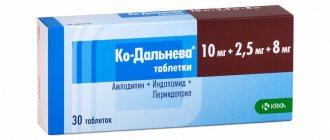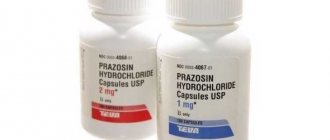“Valz” is widely used to treat high blood pressure. Due to the increase in the lumen in the vessels, blood begins to be better distributed and circulated.
The drug is prescribed to patients to normalize blood pressure levels. Before use, it is important to read the description of action and instructions for use. The drug is prescribed to patients who have high blood pressure.
Medicine Valz for the treatment of high blood pressure
Compound
So, what is the drug discussed in this article? It is available in the form of film-coated tablets. Each such tablet contains the main active ingredient (valsartan) in a dosage of forty, eighty or one hundred sixty milligrams (depending on the total dosage of a particular tablet), as well as a number of excipients (for example, talc, colloidal silicon dioxide, lactose monohydrate, magnesium stearate , microcrystalline cellulose, povidone, croscarmellose sodium).
The manufacturer also describes the composition of the film shell in as much detail as possible: talc, lecithin, polyvinyl alcohol, titanium dioxide, macrogol, yellow iron oxide (dye). In Valz tablets with a dosage of eighty and one hundred and sixty milligrams, red iron oxide (dye) is additionally added to the shell composition.
The components of the medicine should be taken into account before prescribing.
Indications for use
In what cases do experts consider it rational to take the drug “Valz”? Indications for the use of the drug in question are as follows:
- Heart failure (we are talking about its chronic form). The drug is used as part of a complex treatment. However, it is important to exclude the combination of ACE inhibitors, valsartan and beta blockers.
- Arterial hypertension.
- A significant increase in survival among patients suffering from acute myocardial infarction (provided that the drug was used in the first twelve hours and continued therapy for up to ten days), which was complicated by left ventricular systolic dysfunction and left ventricular failure. An important condition is stable hemodynamic parameters.
At the same time, the action of “Valz” is extremely narrowly focused. You should not prescribe it yourself. This can only be done by an experienced doctor who will have complete information about the state of your health.
Compatibility with other drugs
"Valz" does not have pronounced compatibility with other drugs, but you should be especially careful when using other drugs with a hypotensive effect, as well as diuretics due to the enhanced effect of lowering pressure. There is a risk of hyperkalemia if Valz is used simultaneously with potassium-containing drugs.
A decrease in the effectiveness of the drug occurs when using NSAIDs. There are reports of increased toxicity and increased plasma lithium levels when administered concomitantly with ACE inhibitors. The use of heart failure medications and Valz is an acceptable practice.
Contraindications
The drug in question is not at all harmless. It can negatively affect certain systems of the body, especially if it is taken uncontrolled, without taking into account the characteristics of the patient and ignoring the contraindications that this medicine has.
So, among the important contraindications are the following:
- Personal exceptionally high susceptibility to the main active ingredient of the drug in question or in relation to its excipients.
- Children under eighteen years of age (due to the fact that a sufficient number of clinical studies have not been conducted in relation to this age group, which means it has not been established how effective and safe the described medicine is for children).
- The period of bearing a child, as well as breastfeeding the baby.
- Renal failure (pronounced). This also applies to those patients who are currently on hemodialysis.
- Obstruction of the bile ducts, as well as other liver dysfunctions, including cholestasis and biliary cirrhosis.
- The presence of personal lactose intolerance or glucose malabsorption syndrome, or galactosemia.
It is important to take into account other conditions in which it is necessary to use the drug in question with extreme caution. These include the following: hyperkalemia, aortic stenosis, arterial hypotension, cardiomyopathy (hypertrophic obstructive), mitral stenosis, hyponatremia, primary hyperaldosteronism, a diet that imposes strict restrictions on sodium intake, bilateral renal artery stenosis, conditions accompanied by a decrease in total blood volume , which continuously circulates (these include, for example, diarrhea and vomiting), stenosis of the artery of a single kidney.
If you know you have any of the conditions described above, be sure to tell your doctor. In this case, he will not prescribe you Valz, which you have contraindications for taking, but will choose a different medicine. If the prescription has already been made, the specialist will adjust the treatment regimen and select a more suitable drug.
Active substance of drugs
The active substance of Concor is bisoprolol, a selective beta-blocker, and Valza is valsartan, an angiotensin II receptor blocker. Bisoprolol reduces the level of plasma renin activity and reduces the amount of oxygen required by the myocardium. The heart rate decreases both at rest and during exercise. Valsartan has a hypotensive effect on the body (i.e., lowers blood pressure), while no negative effects on cholesterol, glucose or uric acid levels were observed.
Enter your pressure
Move the sliders
120
on
80
Mode of application
How exactly should the drug in question be used? It is taken orally, without being tied to meals. The tablets should be taken with plenty of clean drinking water. Other nuances of use depend on the specific disease the drug is used to correct. Let's consider a variety of options:
- Arterial hypertension. At the beginning of treatment, take the drug once a day at a dosage of eighty milligrams. A stable decrease in blood pressure occurs within the first two weeks of treatment. And maximum effectiveness begins to appear only after a month of therapy with this drug. If the above dose becomes insufficient and does not give the desired result, then experts recommend increasing it to one hundred and sixty milligrams per day. As a rule, an antihypertensive drug with a different profile of action (for example, some kind of diuretic) is prescribed in parallel.
- Chronic heart failure. In this case, it is recommended to start by taking forty milligrams of the drug twice a day. If the desired therapeutic effect is not achieved, then you will need to gradually increase the dose to eighty milligrams of the drug twice a day. And provided that the patient tolerates the treatment well, the dose can be one hundred and sixty milligrams twice a day. The maximum allowable dose is three hundred twenty milligrams of the drug twice a day. However, the increase in the dose of the drug from the initial dose to the maximum dose should be at least two weeks. If diuretics are prescribed at the same time, then it would be rational to slightly reduce the dose. Do not combine this drug with a beta blocker and an ACE inhibitor under any circumstances. At the same time, it is allowed to simultaneously use other medications that are prescribed by specialists to cope with heart failure (chronic).
- Recovery after myocardial infarction. If hemodynamic parameters remain stable, then within the first twelve hours after acute myocardial infarction the drug in question can be used. The initial dose can be twenty milligrams twice a day. Subsequently, the dose is increased to forty, eighty and even one hundred and sixty milligrams twice a day. This treatment should be continued for several weeks. The maximum dose in this case is one hundred and sixty milligrams twice a day. A dose of eighty milligrams twice a day can be achieved no earlier than after two weeks of therapy, and a dose of one hundred and sixty milligrams twice a day - only after three months of treatment. Increasing the dose is possible only if the patient tolerates the therapy well.
- Malfunctions of the liver and kidneys. In the presence of impaired renal function, the above initial dose is considered sufficient. In the presence of mild to moderate liver dysfunction, provided there is no cholestasis, the daily dose should be no more than eighty milligrams.
Remember that during treatment you must carefully follow the recommendations of your doctor. This will help you avoid causing unnecessary harm to yourself and get the expected result.
Drug interactions
Valz is an active drug, so you should be aware of its drug interactions. This is stated in the instructions:
- The medication can be combined with diuretics or used in monotherapy. A combination of Valza with antiplatelet acetylsalicylic acid and beta-blockers is acceptable. Combination with ACE inhibitors is prohibited.
- The combination of the product with lithium preparations is not recommended (the level of the metal in the blood increases, toxicity increases).
- Combinations that require caution: with non-steroidal anti-inflammatory drugs (the antihypertensive effect of Valza decreases, kidney function worsens, the level of potassium in the blood increases), Rifampicin, Cyclosporine, Ritonavir (systemic exposure of valsartan increases).
- The tablets do not interact with Warfarin, Cimetidine, Glibenclamide, Furosemide, Amlodipine, Digoxin, Hydrochlorothiazide, Atenolol, Indomethacin.
Side effects
As with any drug, patients may experience some side effects from time to time. In order to respond in a timely manner to any reactions that arise, it is important to know exactly what can expect you. Therefore, we suggest that you carefully read the list of side effects of Valz. Among them, the following are especially distinguished: vasculitis, orthostatic hypotension, cough, sometimes a decrease in blood pressure, bleeding, diarrhea, heart failure, nausea, vertigo, abdominal pain, dizziness, neutropenia, postural dizziness, decreased libido, thrombocytopenia, syncope, arthralgia, may occur. neuralgia, itching, headache, muscle cramps, depression, hyperkalemia, insomnia, viral infections, serum sickness, skin rash, upper respiratory tract infections, angioedema, arthritis, hypersensitivity, back pain, sinusitis, myalgia, conjunctivitis, impaired functioning kidneys, gastroenteritis, acute renal failure, edema, rhinitis, pharyngitis, asthenia, rhinitis, decreased hematocrit levels, feeling tired, nosebleeds, decreased hemoglobin levels, excessive concentration of urea nitrogen in the blood serum, hypercreatininemia, stimulation of transaminases (“liver” activity) ), as well as hyperbilirubinemia.
If you notice any of the symptoms described above, immediately consult your doctor. He will prescribe you the correct treatment to alleviate your current condition, and will also help you adjust your treatment regimen.
Overdose
When an overdose occurs, patients note a significant decrease in blood pressure. This can provoke collapse or fainting. To eliminate the effect of an overdose, you should rinse your stomach and then use a sorbent, you can use activated carbon. It is recommended to administer a solution of 0.9% sodium chloride intravenously. In the case of dialysis patients, it will not be possible to remove Valz without medical assistance.
Treatment. Gastric lavage, taking a sufficient amount of activated carbon
Use during pregnancy
Reviews from cardiologists about Valza do not contain information about the practical experience of using the drug in question by pregnant patients. However, theoretical studies allow us to establish that, taking into account the mechanism and characteristics of fetal development, this medication can cause significant harm to the baby if taken in the second and third trimesters of pregnancy. This means that on the same day when the fact of pregnancy was established, any therapy involving the drug “Valz”, which includes the active substance valsartan, must be discontinued, regardless of any extraneous circumstances.
To date, there is no data on whether the above valsartan is excreted directly into breast milk. Therefore, it is important to immediately discuss with your healthcare provider whether to stop taking the drug or breastfeeding. It is necessary to objectively evaluate the benefits of therapy with the drug in question and compare it with the possible risks for the child.
Negative consequences
Valz can cause the following side effects:
a sharp decrease in systolic and diastolic pressure when the body position changes (rising, falling) in people who have survived a heart attack; decrease in blood pressure levels; cardiovascular failure; dizziness and fainting; depression; decreased levels of neutrophils in the blood; muscle and body pain; increased potassium levels in the blood; the occurrence of diseases caused by viral infection; fatigue and weakness.
It is important to note that Valz reduces concentration, reduces the speed of physical actions and mental reactions. Therefore, motorists, pilots and other people engaged in dangerous and responsible activities should approach the drug with extreme caution.
Important! Valz and other drugs with the same active ingredient should not be used for treatment by people whose work requires a lot of attention and concentration.
The price of the drug depends on the number of tablets in the package and dosage. It varies from 290 to 970 rubles.
Analogs
But what about those patients who are indicated for the use of the drug in question, but they have significant contraindications to its use? How to replace "Valz" with such a sick one? Fortunately, there is a way out. Doctors recommend turning your attention to Valz analogues. They are available in a certain variety. So, the following are especially highlighted:
- "Diovan."
- "Nortivan."
- "Valaar."
- "Valsakor".
- "Valsartan".
Under no circumstances should you prescribe an analogue yourself. If you find out that you have any kind of contraindications to the use of the drug "Valz", the instructions recommend that you immediately consult a doctor who can competently assess your current physical condition and update your treatment regimen. Only a qualified specialist will be able to make the right decision and make the right appointment. Only in this case will the Valz analogues benefit you. Don't risk your health. Do not attempt to make appointments yourself.
Release form
"Valz", as a medicinal product, is currently produced exclusively in the form of tablets, which have a special film coating. There are several available dosages (forty, eighty and one hundred and sixty milligrams of active ingredient in each tablet). The price of "Valza" ranges from 270 rubles to 994 rubles, depending on the dosage and manufacturer.
The blisters in which the tablets in question are sold are made from artificial materials - plastic derivatives, such as PVDC, PE, PVC or aluminum foil. One cardboard package of this drug may contain two or four blisters of seven tablets each, one, two or three blisters of ten tablets each, or four or seven blisters of fourteen tablets each, as well as instructions for use. But a cardboard box of medication (the kind usually used in hospital inpatient departments) may contain fifty or one hundred blisters of tablets, as well as detailed instructions for their use.
Peculiarities
Valz is an oral specific antiotensin II receptor antagonist. The main property of this drug is its hypotensive effect, that is, a decrease in a person’s blood pressure level.
There is only one form of release of Valz - tablets with different volumes of active ingredient (40, 80, 160 or 320 milligrams). They are sold in appropriate blisters, which are packed in cardboard boxes. The photo shows them to be white with a pink upper left area.
Valz supplies Russia with one registered in Iceland. The facilities of this enterprise are located in Malta. This country has its representative office in Moscow at 18 Sushchevsky Val Street.
The active ingredient of Valza is Valsartan. Its mechanism of action allows it to lower blood pressure levels. However, the composition of the drug contains many other components. They only help to properly absorb the drug by the patient’s body.
Reviews
Cardiologists evaluate Valz differently. It is important to carefully study their opinions on this matter. After all, if specialists trust the drug and see the results of its action on their patients, then this medication deserves our attention to the same extent. So, what specific nuances particularly highlight the reviews of cardiologists about Valz? Among them are the following:
- The amazing property of the drug in question is that its sudden withdrawal (which can happen for completely different reasons) will not bring any harm to your body and physical condition, much less significant. This means that this medicine is absolutely safe in this regard.
- It is important to take into account that the drug "Valz" should never be used if you suffer from any diseases of the kidneys or biliary tract.
- We must not forget that the medication in question can affect how correctly you drive a vehicle. Therefore, to ensure your own safety and the safety of other road users, it is not recommended to take this drug if you plan to drive.
- An undoubted disadvantage is the large number of side effects, which in no case should be ignored. The patient may suddenly experience a significant drop in blood pressure or a decrease in neutrophil counts in the blood. If you notice any adverse reactions in yourself, contact your doctor immediately. Your treatment regimen may need adjustment.
Some experts express firm confidence that the drug “Valz” is certainly effective in treating those diseases for which it is, in fact, intended to get rid of. However, it is important to take into account the fact that under no circumstances should it be used uncontrolled, since the drug in question has a large number of contraindications and possible adverse reactions. Therefore, before starting treatment with Valz, you must consult with a competent specialist. “Valz” has not received categorically negative reviews from cardiologists, since, for the most part, it brings the expected results.
As a result, experts give the drug in question a solid “B”. It cannot receive the highest score, since in its essence it is not completely harmless and can even cause some harm to some patients. Among other things, it is strictly forbidden to use it uncontrolled without consulting your doctor. Nevertheless, “Valz” still receives a decent assessment from experts.
Can I take it together?
Concor retains its hypotensive effect throughout the day and is indicated for a long course of use. "Valz" is quickly absorbed and begins to act after two hours, maintaining activity for 24 hours. You can combine "Concor" and "Valz" and take them together. They have good compatibility, and simultaneous use shows excellent results in the treatment of hypertension. "Concor" is usually taken in the morning, and "Valz" in the evening, this increases their effectiveness. It should be recalled that only a cardiologist should prescribe drugs and their dosage; self-medication is very dangerous with serious consequences.
Storage conditions
As the instructions recommend, Valz should be stored in a place where the medicine will not be exposed to direct sunlight. The temperature here should not exceed thirty degrees. It is important that children and those who are unable to take responsibility for their actions do not have unsupervised access to the drug in question.
Under the conditions described above, the drug "Valz" can be stored for no longer than three years from the moment it was produced. After the specified time, the use of the drug in question is strictly prohibited. This may harm the patient's physical condition.
On what basis is the medicine “Valz” dispensed from pharmacies? Of course, only with a prescription issued by the patient’s attending physician. This is a necessary condition in order to protect potential buyers from uncontrolled use of the drug, which has a number of side effects. Its use without a doctor's prescription can significantly harm your health.
Taking Valz tablets after drinking alcohol
Feedback from patients helps to understand when and in what quantities you can drink alcohol after a course of therapy with vasodilator drugs. For chronically high blood pressure, experts have established acceptable standards for the use of ethanol in its pure form. For women, this dose is 15-20 ml per day, for men - 30-40 ml. Men are allowed to take no more than 100 ml of strong drink per day, the strength of which does not exceed 40 degrees. Based on the degree of wine, the dose should be limited to 300-350 ml. For females, calculations should be 2 times less.
It is recommended to completely exclude beer drinks, because drinking beer involves eating salty foods (crackers, chips, anchovies, pistachios, etc.). Salt prevents the removal of fluid from the body, which means it prevents poisons and toxins from being freely excreted by the kidneys and liver.
Valz tablets can be taken one day before the expected drinking party, or 14 hours after - for men. Women are advised to refrain from taking the medication within 20 hours after drinking alcohol, or take the drug 32 hours before drinking alcohol.
If a specialist has prescribed a course of drug therapy, you should exclude recreational drinks not only for the entire course of treatment, but also for 2-3 weeks after it. This reduces the risk of undesirable consequences.
Conclusion
So, is Valz a high-quality and effective remedy for high blood pressure? Many specialists and patients say yes. And with good reason. Provided that the dosages prescribed by the attending physician are strictly followed, after a couple of weeks of treatment, a stable positive effect can be achieved. This, of course, has a positive effect on the reputation of the drug and its manufacturer. We remind you that it is important to carefully follow all the specialist’s recommendations and not prescribe it to yourself. After all, such uncontrolled use will inevitably lead to the development of harmful side effects that sometimes cause irreversible harm to the body.
Be careful when choosing medications. And always be healthy!
The advantage of the drug over other antihypertensive groups
When using drugs from the group of angiotensin-converting enzyme inhibitors, the drugs closest in mechanism of action to Valsartan, bradykinin accumulates and a dry, painful cough appears. This symptom develops as a result of the fact that the angiotensin-converting enzyme is capable of destroying bradykinin; if there is insufficient utilization, the substance accumulates. This leads to the development of a side effect. Valz does not reduce the level of ACE in the blood, so the enzyme continues to destroy bradykinin, and a cough is not registered.
When comparing Valsartan with amlodipine (a calcium antagonist) in randomized clinical trials, it was proven that the drugs reduced blood pressure equally during the day and at night. However, after two weeks of taking the drug in high dosages, the following side effects became more frequent in the group taking amlodipine:
- swelling in the legs;
- increased heart rate.










